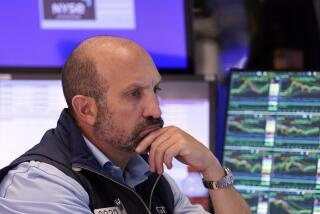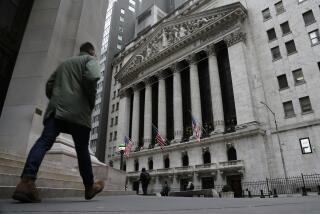The U.S. Dollar Soars and Swoops on the Winds of World Speculation
- Share via
NEW YORK — Once again the world’s money markets are churning, and once again the world’s central bankers are at cross-purposes. The dollar, which only weeks ago was the sick man of the foreign-exchange markets, soared like an eagle for a few days; and while the West German Bundesbank is doing what it can to hold the dollar down, the Japanese, smiling serenely, are watching it fly. Meanwhile in Washington, an Administration that spent its first term gloating over the dollar’s rise before spending most of its second term trying to force it back down has switched back to its original line: The dollar is strong because the Administration’s policies have been successful at making America a good place to invest.
The average citizen can be excused for feeling dizzy. For more than two years the dollar has been on the skids; the only question seemed to be how fast it would fall. Only weeks ago the world’s economic leaders posed for snapshots in Toronto with their arms around one another, smiles glued to their faces. Suddenly, everything turned around. The dollar bounced; the allies squabbled.
With the United States no longer trying to keep its currency down, investors took another look at the dollar last month, and many liked what they saw--short term. The trade deficit has been shrinking and inflation is low. Other countries, particularly Britain, have been looking less robust. All over the world, portfolio managers edged into dollars.
The spat involving West Germany, the United States and Japan is another case of plus ca change. Vows of eternal friendship and cooperation are the oldest tradition in diplomacy; the second oldest is breaking them. The major Western nations were briefly scared into something like sincerity after the crash last fall, but the shock has worn off and business is back to normal.
West Germany is worried about a strong dollar because that means higher prices for its imports and, although German inflation now averages a modest 1% per year, this is too much for the timid souls at the Bundesbank--West Germany’s even more conservative version of the U.S. Federal Reserve. Meanwhile, the outlook for the mark has turned cloudy. The reasons: West Germany’s record budget deficit and its fear of inflation. Unemployment stands at almost 9%; the West Germans don’t expect to lower this by much, but they’ve refused to abandon the poor to wander homeless through their streets. Obviously, this means continued social spending and a continuing deficit problem. The West Germans--burned by horrifying inflations in the aftermath of both world wars--see inflation under every bed, and the combination of record budget deficits and a rising dollar scares them silly. If the dollar goes up, so will the West German cost of goods priced in dollars--including oil. More inflation, more worry. West Germany will tighten its interest rates to protect its currency, less willing than ever to take a turn as the world’s “economic locomotive.”
Japan, on the other hand, welcomes the revitalized greenback. A stronger U.S. dollar means profits for Japan’s bondholders, as well as a nice dividend for those who have invested in U.S. property and companies. As an added sweetener, if the dollar drifts up from its present level of about 135 yen and stabilizes above 140 yen, Japan’s goods would begin to become more competitive in the American market.
In Washington, the rise in the dollar is being greeted with quiet satisfaction--at least by friends of George Bush. While a higher dollar will make American goods less competitive in the long run, and therefore tend to freeze the trade deficit at a figure not far below the current annual level of $140 billion, recent experience suggests that this will not show up in the statistics for months or even years--until, in other words, long after the second Tuesday in November.
Other short-term benefits of a rising dollar are to cool off inflation and bring down interest rates while attracting foreign investors. The prospect of low interest rates, low inflation and good trade statistics on Election Day intrigues the GOP. A frisky stock market wouldn’t hurt either; a hefty 1988 rise could make October, 1987, look very long ago and far away.
In the long run--post-election--the outlook isn’t as rosy, either for the greenback or for the country. Figures released late last month show that the United States has continued its rake’s progress into debt, adding $99 billion to an already awesome debt mountain and putting us on ground where angels, or even Argentines, fear to tread. Even more confusing, perhaps, to those who follow the numbers: The trade deficit, after shrinking from $13 billion in January to $9.89 billion in April, is believed to be increasing again, with most Wall Street soothsayers predicting a $12 billion figure to be released next week.
At some point in the not-so-distant future, investors will stop looking at the rosy short-term prospects of the dollar, and take another look at the bearish fundamentals. At that point, the dollar would start down again even if interest rates rose; this is an explosive mix last seen shortly before the crash of ’87. Then it will be time for the United States to call upon its allies once again for cooperation and assistance. But without a much higher order of statesmanship than we have seen lately, the allies will respond with sympathetic words, vague promises--and very little else.
For now, West Germany is the odd man out. Japan and the United States have effectively blocked the Bundesbank from carrying out its chosen policies. There is nothing wrong with playing international games of this sort so long as no one is eriously hurt.
The problem is that the United States plays for short-term gains at the expense of long-term position. West Germany today can weather the opposition of Japan and the United States; the increase in the value of the dollar is a nuisance, not a danger, to the West German economy. But given U.S. levels of debt and vulnerability to a run on the dollar, we may find ourselves in a more serious position.
We are the only major country in the world today trying to operate without a vision of our national economic future.
As the world’s largest debtor, with trade and budgetary deficits out of control, and with the destiny of its currency in the hands of speculators and foreign central banks, America must expect a great many more economic surprises--swoops and falls of dollars, roller coaster rides for stocks and bonds, booms and busts in commodity and real estate markets. Not all of these surprises will be nice ones.
Given the limits to international economic cooperation, and the serious deterioration of the American economic position, the United States needs a long-term game plan, preferably a bipartisan one, for advancing vital economic interests. Clearly, nothing like this is on tap until after November. Meanwhile, all of us have to hope that the cost of delay will not be too high.
More to Read
Inside the business of entertainment
The Wide Shot brings you news, analysis and insights on everything from streaming wars to production — and what it all means for the future.
You may occasionally receive promotional content from the Los Angeles Times.










